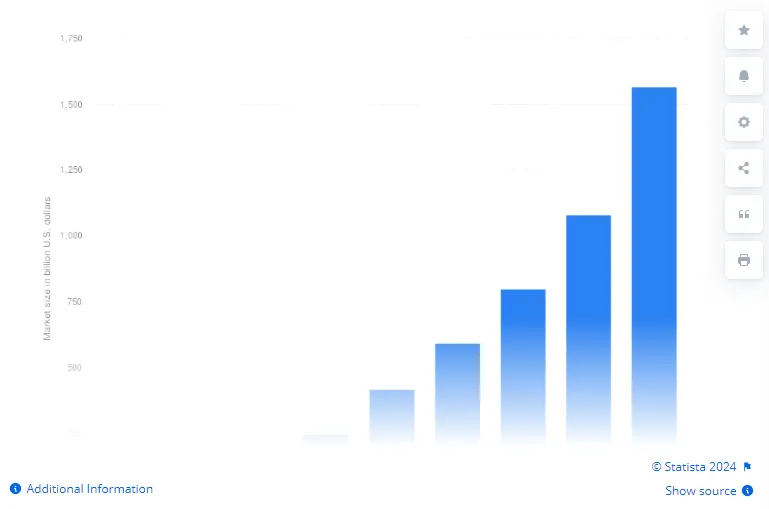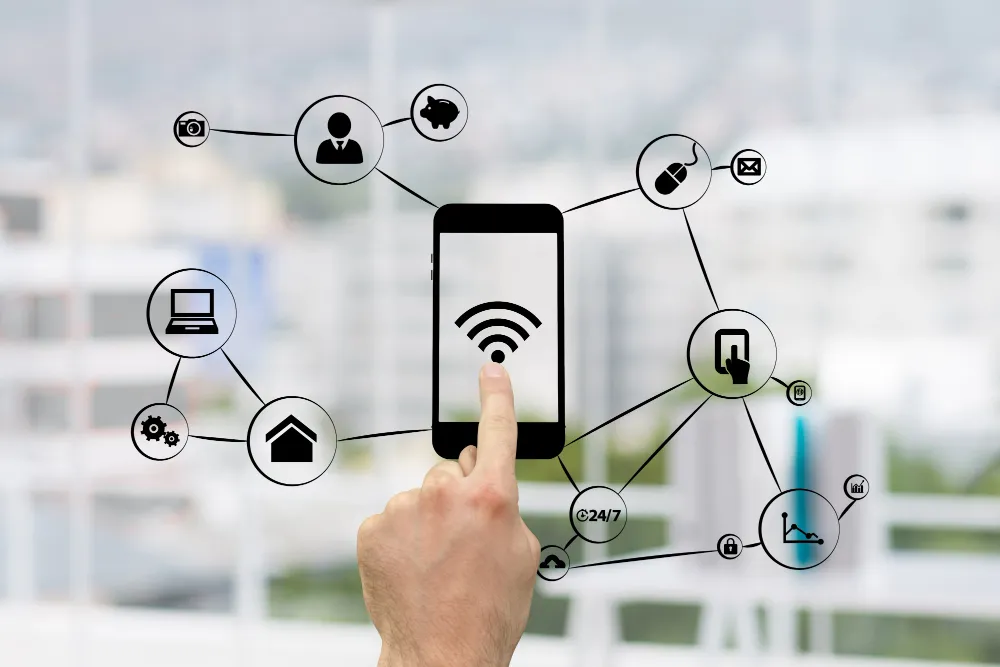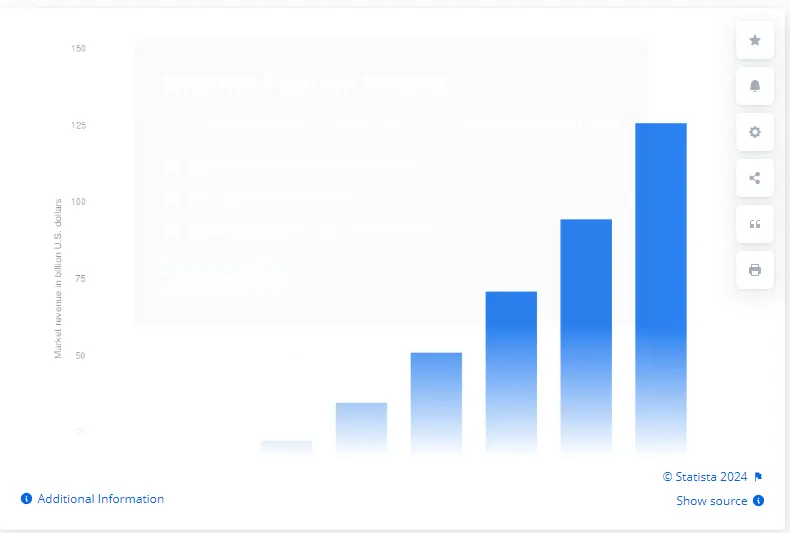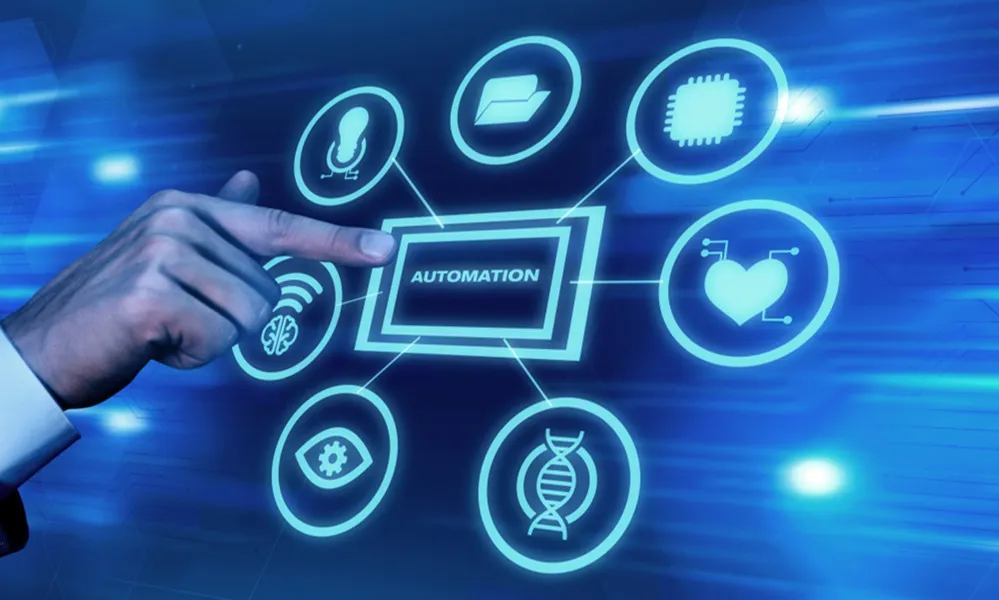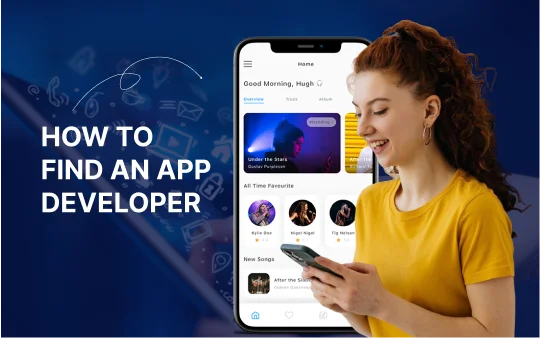If I talk about trending technologies, then both Artificial Intelligence (AI) vs Internet of Things (IoT) are currently at the top of the list. Whether it is IoT or AI, both are giving neck-to-neck competition; this is why nowadays businesses are inclined to embrace both technologies in software development.
- 83% of companies have enhanced their efficiency by introducing IoT technology.
- Around 79% of executives consider adopting AI in the industry will make their work effective and more manageable.
Now the question is, what is the difference between AI and IoT. To know the same, read further…
What is the Internet of Things (IoT)?
The Internet of Things (IoT) is a system of interrelated, internet-connected objects that can accumulate and convey data over a wireless network without human interference.
Famous companies using IoT: Google, Amazon, Microsoft, and more
Image Source: Statista
Worldwide, the market for Internet of things (IoT) end-user solutions is anticipated to expand around $1.6 trillion in size by 2025.
IoT is a trend for mobile app development, but when it comes to integrating IoT technology in the business or app development process, then it is pretty complex, so to make this process easier, you can avail of IoT software development services from trustworthy IoT app development company India.
Align your tech strategy, explore the differences and applications of AI and IoT technologies.
Benefits of Internet of Things (IoT) in Businesses
Here we have mentioned the key benefits of using IoT in business. If your business has till now not adopted the IoT technology, then include it; this will help you make the business process easier.
- Reduction of operating costs: IoT solutions can help enterprises cut costs and maintain a competing advantage. In the manufacturing sector, IoT devices monitor equipment and decrease downtime by predicting misalignment on the production line.
- Understanding of consumer behavior: Understanding consumer choices and behavior can help businesses attain success, and with IoT grasping such important things are possible. Using IoT, businesses can gather, monitor, and examine data from social media, video surveillance, mobile, and internet usage.
- Improved customer service and retention: Using IoT, businesses can collect user-specific data via smart devices and understand customers’ expectations and behavior. Doing so can help businesses improve customer service by facilitating follow-ups after sales, such as automatic tracking and customer retention.
- Improved safety: Using IoT technology in various devices such as surveillance cameras, motion sensors, and other monitoring devices can help businesses form products offering high-level security.
Also Read: IoT in Healthcare: Benefits, Challenges, and Applications
Disadvantages of IoT
Well, all things can’t be wholly perfect same like that IoT is also having few drawbacks stated here:
- Security Flaws: IoT technology gathers data from various sources, and this is why the technology lacks in offering high-level security.
- Associated costs: Implementation of IoT infrastructure in a business intends to build a huge network including multiple smart devices, a massive power supply grid, and a communication network. Doing all this may require high costs.
- Network dependence: The key feature of the Internet of Things is the enormous amount of interconnections between multiple devices and access to the worldwide network; these networks depend on each other means if one shows the error, then others working will also get affected.
These disadvantages can be converted into benefits, but you need to apply an extraordinary strategy for that. And only experts can do this thing in a better way, so, in order to leave these IoT cons behind, hire IoT developers working in the topmost IoT development companies.
What is Artificial Intelligence (AI)?
Artificial Intelligence(AI) relates to the simulation of human intelligence in machines designed to ponder like humans and imitate their actions. AI can be employed as any machine that displays traits correlated with a human mind, such as learning, understanding, and problem-resolving.
Worldwide, the Artificial Intelligence (AI) software market is projected to grow swiftly in the coming years, reaching around $126 billion by 2025.
Image Source: Statista
To make efficient use of AI in your business process, avail of Artificial Intelligence development services from the top Artificial Intelligence development company. Doing so will make adequate use of AI solutions.
Learn how AI and IoT solutions can propel your business forward.
Benefits of Artificial Intelligence in Businesses
Here we have mentioned a few factors which can help you know why AI is important for business and how it is helping various industry verticals in growing.
- Real-Time Analytics: Using AI, businesses can process a massive amount of data and render it in real-time. It is one of the topmost advantages of AI for business. This approach enables enterprises to make vital decisions fast.
- Better Customer Experience: AI-based chatbots are competent in rendering round-the-clock user request support at any time. Better communication quality and shorter reply times help businesses improve existing customers’ loyalty and drag new ones.
- Data Security Improvement: AI can successfully be utilized to recognize fraud efforts and illegal access to personal data; this is why most finance and banking industries use AI technology.
- Predictive Analytics: AI technologies can manage the enormous amount of arrays, recognizing patterns and foretelling the future. Most businesses are interested in predicting things so that they can minimize the imminent risk and other things; these all things can be simply done with the help of AI.
Read Also: Artificial Intelligence Vs. Machine Learning Vs. Deep Learning: New Ethics of Future Advancement
Disadvantages of AI
The pointers mentioned here are a few cons of Artificial Intelligence (AI). Well, you can lessen the effectiveness of AI cons, and for doing so, you can hire AI programmers from the foremost AI development company.
- Higher Costs: Introducing AI in app development is a time taking process, and it may also cost an immense deal of money. Moreover, it is also a complex task to develop AI-integrated software programs.
- No creativity: Well, with AI, you cannot do innovative things. AI is proficient in learning over time with pre-fed pieces of information and experiences, but it can’t act like a creative approach.
- Make Humans Lazy: AI applications automate the bulk of slow and monotonous tasks. Since we do not have to remember things to resolve puzzles, and all this can make humans lazy.
AI vs IoT: Know The Difference Between AI and IoT
The aspects stated here will help you know the exact difference between AI and IoT. If, after reading the pointers, you are still confused about IoT and AI, then get connected with the experts working at the top-notch Artificial Intelligence development company. Doing so will help you know which one will be best for your business, seeing the process and needs.
1. Cloud Computing
AI is a highly strong software that can think, perform and learn from human instances. Well, Artificial Intelligence (AI) and the Internet of Things (IoT) are both complementary in performance, but IoT Cloud gives a pathway to handle data.
2. Procuring obtainable data
Artificial Intelligence (AI) understands, learns, improves its performance from mistakes. Moreover, it also helps in making efficient decisions making where IoT captures consequences on sensors that gather and store data whenever required.
3. Data
Artificial Intelligence has the capability of understanding the pattern and behaviors where the Internet of Things (IoT) is all about sensors.
4. Algorithm
AI is totally based on deep learning algorithms, which are gathered from multiple sources to produce the behavior of the system. IoT is utilized for building an algorithm to express the system’s behavior.
5. Behavior
AI is all about spontaneous reactions to receiving the input. At the same time, IoT stores predefined responses that are triggered utilizing the devices and are predefined by applying particular codes based on various algorithms.
ValueCoders includes a dedicated development team that can help you make adequate use of various technologies like AI, IoT, Machine Learning, Blockchain. So, if you are finding reliable solutions related to these technologies, get in touch with us.
Discover how AI and IoT can work together to drive business growth.
AI vs IoT: Table Showing The Difference Between AI and IoT
| Aspects | Artificial Intelligence | Internet of Things |
| Capability | Never estimates the machine abilities | Knew the device abilities beforehand |
| Online /Offline | Related to online features & responses | IoT even can even work without the Internet |
| System | Is all system behavior | It is inbuilt in a system |
| Scalability | Less Scalable | Scalability based on cloud |
| Cost | Higher cost | Moderate cost |
| Interaction | Doesn’t require human interactions | Human Interaction required |
| Dependency | It is not dependent on IoT | It won’t work without AI. |
| Future Scope | A machine can learn and start acting like a human | Human Interaction required |
| Need of Instructions | It learns from experiences | Required to instruct devices |
| Applications | Chatbots, Natural language processing, Job Adverts, Machine vision, Speech recognition, etc | SSmart City, Smart Wearables, Water Monitoring, Smart Home, and so on. |
Ending Word
Individually and collectively, IoT and AI will remain the best trends in the future. It is already known that massive data is really hard to gather and understand if produced in large amounts. However, using IoT, you can deal with this situation. Similarly, there are various tasks that are complex for businesses to perform. These tasks include efficient decision-making, predicting behavior, etc. But, with AI, such works become easy to perform.
Several differences and similarities are there in the functioning of both technologies, AI vs IoT. But both are very impactful if the potential of both technologies is correctly employed in the business process. In order to make adequate use of AI and IoT in business software development, hire AI developers in India or hire IoT developers working in one of the best AI development companies (ValueCoders)


